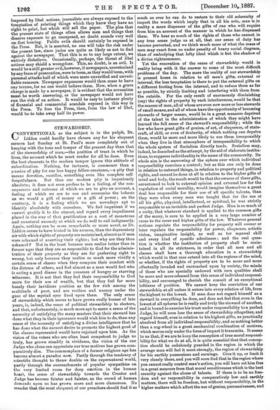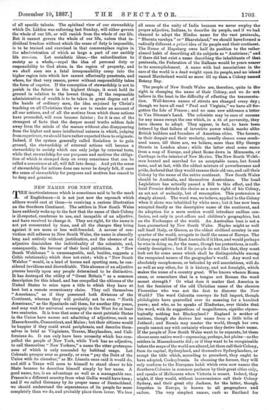STEWARDSHIP.
ONVENTIONAL as the subject is in the pulpit, Dr.
Lidclon could hardly have chosen any for his eloquent sermon last Sunday at St. Paul's more completely out of keeping with the tone and temper of the present day than that of the stewardship of man,—the position of trust in which he lives, the account which he must render for all he does. Even the best elements in the modern temper ignore this attitude of subordination. Nothing, for instance, is commoner than a passion of pity for our less happy fellow-creathres,—a pity that means devotion, sacrifice, something even like complete self. forgetfulness. But then our modern pity is imperiously absolute ; it does not even profess to be a feeling, of the con- sequences and outcome of which we are to give an account, a feeling of which we are to use and economise the behests as we would a gift of money or a gift of power ; on the contrary, it is a feeling which we are nowadays apt to identify absolutely with ourselves. We feel impatient if we cannot gratify it to the utmost, and regard every impediment placed in the way of that gratification as a sort of monstrous and unnatural anomaly at which we do well to rail indignantly. Again, nothing can be more remarkable or more novel, as Dr. Liddon seems to have hinted in his sermon, than the deprecatory air with which rights of property are maintained, almost as if men were ashamed of asserting their rights ; but why are they thus ashamed P Not in the least because men realise better than in former ages that they are as responsible to God for the adminis- tration of their property as they are for preferring right to wrong, but only because they realise so much more vividly a certain sense of shame when they compare their comfort with the distress of others, and feel almost as a man would feel who is eating a good dinner in the presence of hungry or starving witnesses. It is not that they feel their responsibility to God more for their use of wealth, but that they feel far more keenly their invidious position as the few rich among the multitude of poor, and are restless and uneasy under the gaze of the myriad eyes fixed upon them. The only sense of stewardship which seems to have grown really keener of late years, is, indeed, the sense of political stewardship to electors, and that, unfortunately, is much more apt to mean a sense of the necessity of satisfying the many masters that their steward has done what they in their ignorance would wish him to do, than any sense of the necessity of satisfying a divine intelligence that he has done what the earnest desire to promote the highest good of the classes represented would have enjoined upon him. As the vieion of the voters who are often least competent to judge us truly, has grown steadily in vividness, the vision of the one Judge who alone can appreciate our true motives has grown com- paratively dim. The commonplace of a former religious age has become almost a paradox now. Partly through the tendency of scientific thought to throw doubts on the supernatural world, partly through the encroachments of popular sympathies on the very limited room for deep emotion in the human heart, the sense of stewardship towards the Creator and Judge has become fainter and fainter, as the crowd of human demands upon us has grown more and more clamorous. No wonder that the most eloquent of our preachers should find it as
much as ever he can do to restore to their old solemnity of import the words which imply that in all his acts,, man is in reality a mere dispenser of the gifts of one who will require from him an account of the manner in which he has.dispensed them. We hear so much of the rights of those who cannot in any true sense judge us at all, that our sense of duty has become perverted, and we think muds more of what the mass of men may exact from us under penalty of heavy social disgrace, than of embodying that lofty ideal which is but the shadow of a divine righteousness.
Yet the renovation of the sense of stewardship would in reality bring with it the answer to some of the most difficult problems of the day. The more the reality of our stewardship is pressed home in relation to all men's gifts, external or internal, the less temptation is there to put the external gifts on a different footing from the internal, and to reduce them as far as possible, by strictly limiting and interfering with them from the outside. For the only result of enormously diminishing (say) the rights of property by such interferences, would be that the masses of men, all of whom are even now more or less stewards of small means, and all of whom have the opportunity of becoming stewards of larger means, would be in a great measure deprived of the talent in the administration of which they might have learned the full sense of the steward's responsibility ; while the few who have great gifts of genius, of art, of eloquence, of state- craft, of skill, or even of dexterity, of which nothing can deprive them, would be more and more likely to use them irresponsibly when they live in that atmosphere of irresponsibility to which the whole system of Socialism directly tends. Socialism may, indeed, be described as the attempt, by the aid of elaborate institu- tions, to suppress individuality in the name of the community. Its whole aim is the narrowing of the sphere over which individual responsibility exercises a control ; but as this can only be done in relation to outward things, in relation to property and political rights, and cannot be done at all in relation to the higher gifts of mind and body, the result would be that the owners of these gifts, accustomed to look to external opinion and external law for the regulation of social morality, would imagine themselves a great deal less responsible for their use of all specific talents, than they were when every man was taught that for the use of all his gifts, physical, intellectual, or spiritual, he was strictly responsible to an invisible and perfect Judge. Man is so much of a unity, that whatever standard is applied to the common gifts of the many, is sure to be applied in a very large number of cases to the rarer and higher gifts of the few. Whatever general notions regulate the responsibility for property will sooner or later regulate the responsibility for power, eloquence, artistic vision, imaginative insight, as well as for manual skill and every kind of specific adroitness ; and the real ques- tion is whether the institution of property shall be main- tained in all its strictness, in order that all men and all classes shall have a thorough education in a stewardship which would in that case extend into all the regions of the mind, or whether, if the rights of property are to be more and more effectually invaded and encroached upon by society, the minds of those who are specially endowed with rare qualities shall be more and more released from this sense of individual reeponsi- bility, and encouraged to cherish the conceit of an exceptional loftiness of position. We cannot keep the conviction of our stewardship at all unless it enters into every relation of life, from the highest to the lowest. If man does not regard himself as a steward in everything he does, and does not feel that, even in the lowest of all spheres he is really and truly the steward of another, and is bound to exercise his trust under responsibility to a perfect Judge, he will soon lose the sense of stewardship altogether, and regard himself, even in relation to his highest gifts, as practically absolved from all individual responsibility, and as nothing better than a cog-wheel in a great mechanical combination of motives, which moves only under the force of impact it transmits. It seems to us that, if we are to keep the conception of true moral responsi- bility for what we do at all, it is quite essential that that concep- tion should be sedulously guarded in the region in which the average man will feel it most strongly, the region of stewardship for his earthly possessions and earnings. Give it up, or limit it very closely there, and you will soon find that in the region where you cannot really control man's action, you will have set him free in a great measure from that moral sensitiveness which is the best security against the abuse of talents. If there is to be no free- dom and no responsibility in comparatively low and earthly matters, there will be freedom, but without responsibility, in the higher matters which affect the use of genius, persuasiveness, and of all specific talent. The spiritual view of our stewardship which Dr. Liddon was enforcing last Sunday, will either govern the whole of our life, or will vanish from the whole of our life. But it cannot govern the whole of our life, unless that in- dividual freedom without which the sense of duty is impossible, is to be trained and exercised in that commonplace region in the administration of which so large a part of our earthly life consists. Let socialistic ideas,—the subordination to society as a whole,—expel the idea of personal duty or responsibility to God alone, in the region of property, and we shall soon see a fatal irresponsibility creep into the higher region into which law cannot effectually penetrate, and where, for that very reason, power without responsibility takes the form of caprice. If the conception of stewardship is not to perish in the future in the highest things, it mast hold its ground in relation to the lowest things. If the responsible administration of wealth is to be taken in great degree out of the hands of ordinary men, the idea enjoined by Christ's teaching on all Christians that we are to render an account of all our actions, and of all the motives from which those actions have proceeded, will soon become fainter ; for it is one of the strangest of facts that the deeper moral truths seldom fade away from the minds of the masses without also disappearing from the higher and more intellectual natures in which, judging f rom experience, we should have rather expected the m to originate. Indeed, if the system generally called Socialism is to gain ground, the stewardship of external actions will become a stewardship to society which can only judge by external tests, while that stewardship for our purposes and motives the obliga- tion of which is stamped deep on every conscience that can be called a conscience at all, will fall into decay. And yet the sense of stewardship for actions done can never be deeply felt, if once the sense of stewardship for purposes and motives has ceased to be deep and genuine.























































 Previous page
Previous page